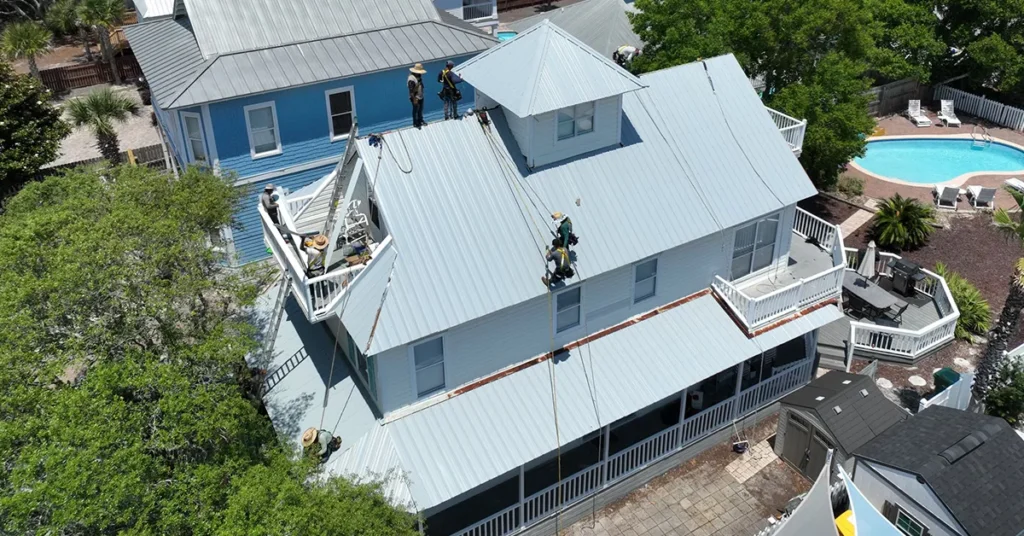Getting a new roof is one of the most significant investments you’ll make in your home. It’s also one of the most important decisions because a good roof protects everything you own. At the same time, a bad one can cause thousands of dollars in damage.
The tricky part isn’t just picking the right materials or design. It’s finding a roof installation contractor who will do the job right the first time. With so many companies out there, how do you know which one to trust with your most significant asset?
The truth is, not all roofing contractors are created equal. Some are experienced professionals who take pride in their work, while others want to make a quick buck and move on to the next job. Learning how to tell the difference can save you money, stress, and major headaches down the road.
Let’s walk through everything you need to know about choosing a roof installation contractor who will give you peace of mind and quality work that lasts.
Start Your Search the Right Way
Ask People You Trust
The best place to start looking for a roof installation contractor is in your neighborhood. Ask friends and family for referrals and make a list of contenders. People who’ve had good experiences with contractors are usually happy to share their stories.
Don’t just ask who they used. Ask specific questions about how the project went. Were the workers on time? Did they clean up each day? How did the contractor handle any problems that came up? These details tell you a lot about what to expect.
Also, check with your neighbors who’ve had recent roof work done. You can see the finished product with your own eyes and get honest feedback about the experience.
Look for Local Companies
Local roof installation contractors have something that out-of-town companies don’t: a reputation to protect in your community. They depend on word-of-mouth referrals and repeat business from people who live nearby.
Local contractors also understand your area’s weather patterns, building codes, and permit requirements. They know which roofing materials work best in your climate and have relationships with local suppliers.
Most importantly, a local company will still be around if you need warranty work or have questions years down the road. Storm chasers and fly-by-night operators often disappear once they’ve collected their money.
Check Their Credentials Carefully
Licensing Requirements Matter
Roofing contractors are required to be licensed by the state and carry liability and workers’ compensation insurance. However, licensing requirements vary by location, so you need to know what’s required in your area.
Don’t just take a contractor’s word that they’re licensed. Call the city to verify that information, even if they show you what looks like proper documentation. Fake licenses and insurance certificates are more common than you might think.
You can check contractor licenses online through your state’s licensing board website. This will also let you see if any complaints or violations have been filed against them.
Insurance Is Non-Negotiable
Every roof installation contractor should carry two types of insurance: general liability and workers’ compensation. Liability insurance protects you if you accidentally damage someone’s property. Workers’ compensation covers their employees if someone gets hurt on your roof.
Don’t accept expired certificates or policies that don’t cover roofing work. Ask to see current certificates and call the insurance company to verify coverage. This might seem like overkill, but you’re protecting yourself from potentially huge liability if something goes wrong.
Some contractors will try to save money by skipping workers’ compensation insurance. If one of their workers gets injured on your property, guess who might be responsible for their medical bills? You.
Get Multiple Quotes and Compare Carefully
The Importance of Detailed Estimates
A trustworthy contractor will provide an itemized list of costs, including materials, labor, permits, and other expenses. Be suspicious of any estimate that gives you one lump sum without breaking down the details.
A good estimate should specify the materials to be used, including brand names and model numbers. It should also explain the prep work included, how the materials will protect your landscaping, and what the cleanup process involves.
The timeline should be realistic, too. A contractor who promises to replace your entire roof in one day probably isn’t planning to do it right.
Don’t Automatically Pick the Lowest Bid
While price matters, the cheapest bid often costs you more in the long run. Extremely low bids usually mean the contractor is cutting corners somewhere. Maybe they’re using more affordable materials, skipping necessary steps, or planning to add “surprise” charges later.
Instead of focusing only on price, look at the value you’re getting. Compare the materials each contractor proposes and the warranties they offer. Sometimes, paying a bit more upfront saves you thousands in repairs later.
Red Flags in Estimates and Sales Pitches
Watch out for uninvited contractors who show up at your door, especially after storms. Storm-chasers, low bids, and more are common red flags that indicate unreliable contractors.
Demanding large upfront payments is a significant red flag because it often leaves homeowners vulnerable to losing money if the contractor fails to complete the work or performs substandard work. Reputable contractors typically ask for little to no money up front.
Be wary of any contractor who pressures you to sign immediately or claims their price is only reasonable “today only.” Good contractors want you to take time to make an informed decision.
Check References and Past Work
Any established roof installation contractor should be happy to provide references from recent jobs. Consider asking for a list of names; ask to see examples of their work in person.
When you call references, ask specific questions. How long ago was the work done? Have they had any problems since? Would they hire this contractor again? These conversations often reveal details that don’t show up in online reviews.
Online Reviews
Check multiple review sites, not just one. Look for patterns in the feedback. Do customers consistently mention the same strengths or problems? Pay attention to how the company responds to negative reviews. Professional responses show they care about customer satisfaction.
Understand the Contract Before You Sign
What Should Be Included
A good contract spells out every detail of your roof installation project. It should list specific materials by brand and model, explain the installation process, and include a realistic timeline for completion.
The contract should also explain what happens if weather delays the project or if they discover unexpected problems like rotted decking. Clear communication about these possibilities prevents disputes later.
Make sure the cleanup process is detailed, too. When the job is done, you shouldn’t be left with a yard full of old shingles and construction debris.
Warranty Information
Most roof installation contractors offer two types of warranties: a workmanship warranty on their installation and manufacturer warranties on the materials. Make sure both are clearly explained in your contract.
Understand what voids the warranties and what you need to do to keep them valid. Some warranties require regular inspections or specific maintenance procedures.
Get warranty information in writing. Verbal promises don’t help you if problems develop years later.
Communication and Professionalism Matter
How They Handle Your Questions
Pay attention to how potential contractors communicate with you during the bidding process. Do they return your calls promptly? Do they answer your questions clearly without getting defensive or evasive?
How they treat you before they have your business often reflects how they’ll treat you during and after the project. If they’re hard to reach or dismiss your concerns now, don’t expect that to improve once you’ve signed a contract.
Project Management and Scheduling
Ask about their current workload and when they can realistically start your project. Be suspicious of contractors who can start immediately unless it’s an emergency repair. Good contractors usually have work scheduled out several weeks or months in advance.
Find out who will be managing your project day to day and how you can reach them if questions or problems arise. You shouldn’t have to wonder what’s happening with your roof replacement.
FAQs
How many quotes should I get before choosing a roof installation contractor?
Most experts recommend getting at least three quotes from different contractors. This gives you a good range to compare prices, materials, and approaches. However, don’t just collect quotes randomly. Focus on getting detailed estimates from contractors who meet your licensing and insurance requirements first.
What’s a reasonable down payment for a roof replacement?
Legitimate roof installation contractors typically ask for 10-20% down at most, with some requiring no upfront payment at all. Never pay more than 25% upfront, and be especially cautious of contractors demanding full payment before starting work. Most of the payment should come after the job is completed to your satisfaction.
How long should a roof installation take?
Most residential roof replacements take 1-3 days depending on the size of your home, weather conditions, and complexity of the job. Simple ranch-style homes might be completed in one day, while larger or more complex roofs can take up to a week. Be wary of contractors who promise unrealistically fast completion times.
Should I be home during the roof installation?
You don’t need to be home the entire time, but it’s helpful to be available for questions and to inspect the work at key milestones. Many homeowners prefer to be present for the first day to meet the crew and for the final walkthrough to ensure everything meets their expectations.
What happens if my roof installation contractor finds unexpected problems?
Good contractors will stop work and discuss any unexpected issues with you before proceeding. This might include rotted decking, structural problems, or code violations that must be addressed. Make sure your contract explains how change orders will be handled and get any additional work approved in writing.
How can I verify a contractor’s insurance is current and adequate?
Ask for certificates of insurance and call the insurance company directly to verify coverage is current and adequate. Don’t accept certificates that are more than 30 days old. The certificate should specifically cover roofing work and include both general liability (at least $1 million) and workers’ compensation coverage.
Making Your Final Decision
Choosing the right roof installation contractor comes down to finding the right balance of experience, professionalism, and value. The cheapest option usually isn’t the best choice, but the most expensive doesn’t guarantee the best quality either.
Trust your instincts about the people you’re dealing with. If a contractor makes you uncomfortable during the sales process, that feeling probably won’t improve once work begins. On the other hand, contractors who are patient with your questions, transparent about their process, and professional in their communications are more likely to deliver a positive experience.
Take time to verify credentials and check references. A few phone calls now can save you from major headaches later. Remember that your roof is too important to rush the decision-making process.
Conclusion
Finding the right roof installation contractor takes time and research, but it’s worth the effort. A good contractor doesn’t just install shingles. They help protect your biggest investment and give you peace of mind that lasts for decades.
Start by asking for referrals from people you trust. Then, verify each contractor’s licensing, insurance, and reputation. Get detailed quotes from at least three qualified contractors and compare them carefully. Don’t rush the decision or let anyone pressure you into signing before you’re ready.
Remember that the relationships you build during this process matter. The best roof installation contractors become partners in maintaining your home. They’re there when you need repairs, have questions about your warranty, or want advice about future improvements.
You’re not just buying a new roof when you find a contractor who checks all the boxes for credentials, experience, and professionalism. You’re investing in years of protection and peace of mind for your home and family.


